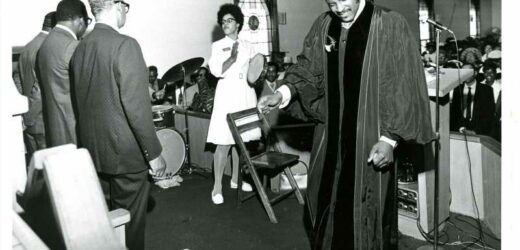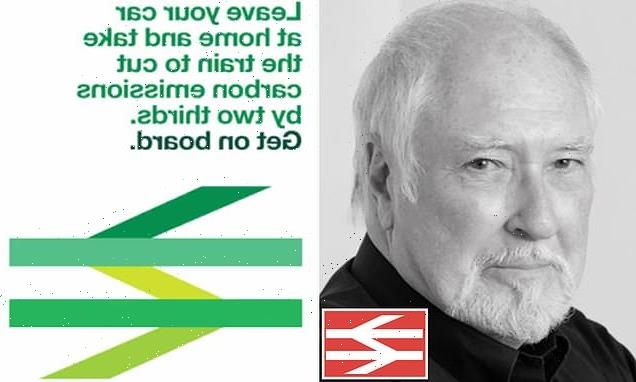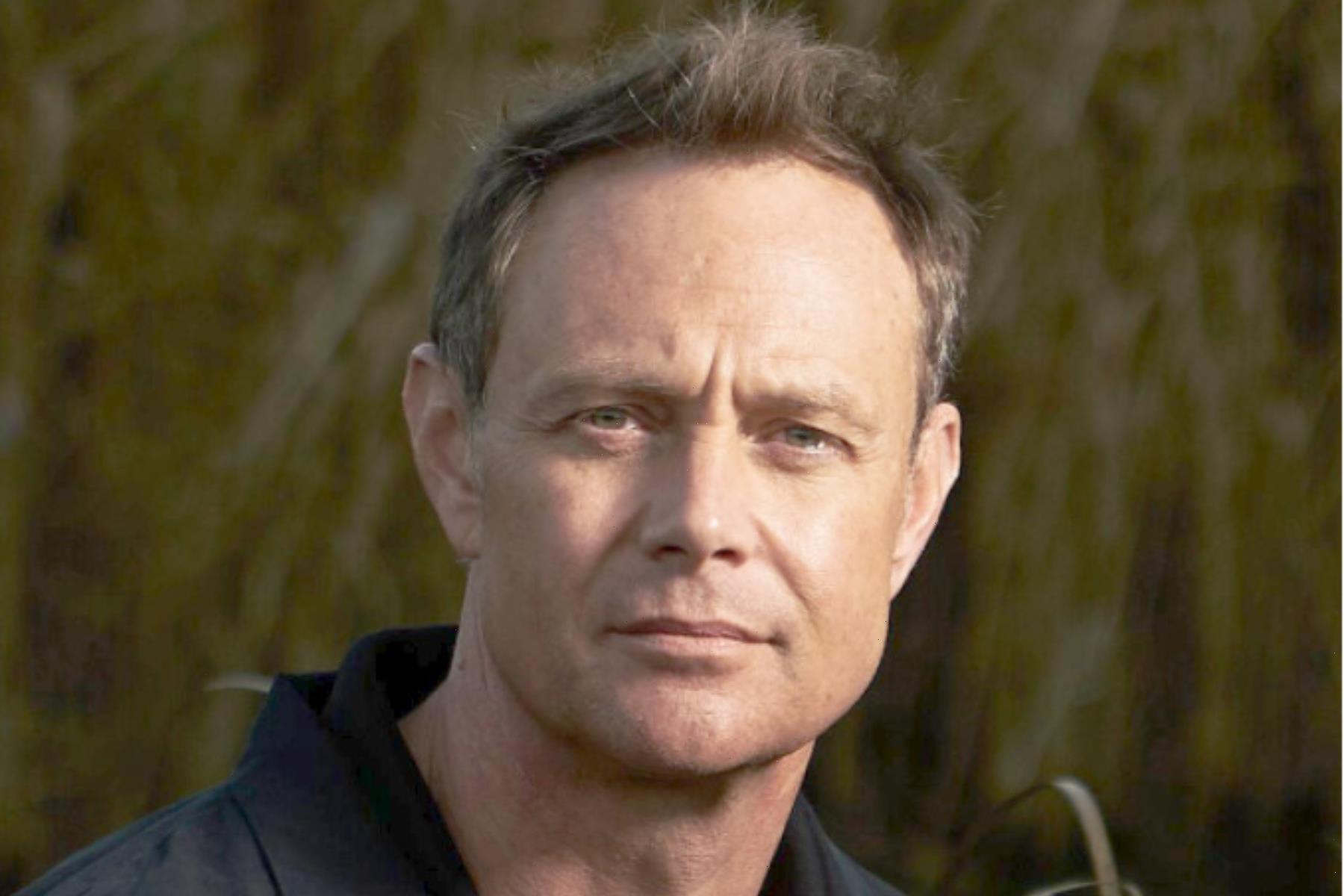“About five years ago, they told me that Kanye West was sampling — I had never heard the term — my music. And I said, ‘Well, I hope he likes it.’ I thought they meant he was listening to it,” Pastor T.L. Barrett tells Rolling Stone. “But my record company said, ‘No, it’s on his album. They want to use two of your songs.’ And it just took off like a rocket.”
A famed Chicago preacher, civil rights activist, community organizer, power broker and — among a small congregation of music fans — a significant yet largely unknown gospel artist, Barrett pinpoints the exact moment where his name began gusting out of the Windy City: When West sampled his 1976 song “Father I Stretch My Hands” for the 2016 The Life of Pablo standout “Father Stretch My Hands.”
Related Stories
Gospel Great Pastor T.L. Barrett's Final, Long-Out-of-Print Single is Finally Available to Stream
First Paul Holes Helped the Catch Notorious Golden State Killer, Now He's Writing a Memoir
Related Stories
20 Overlooked Bob Dylan Classics
The 30 Sexiest Music Videos of All Time
Fifty years after Barrett first recorded his debut LP — and nearly four decades since he created any new music — his devotional catalog has proliferated its listenership in unlikely ways outside of his weekly church service: The end credits of a movie here, the theme song for the NCAA basketball tournament there, a commercial, a sample, an interpolation, a Leon Bridges cover… little by little, music fans have come to discover the talent that Chicagoans have long cherished as their own.
“He’s not an obscure figure in Chicago. He’s got a street named after him now,” says Rob Sevier, whose archival record label Numero Group will release the first in-depth exploration of Barrett’s musical career, I Shall Wear a Crown, on Friday. For over 50 years, Barrett has preached within a two-block radius in Chicago. With the new collection, the pastor aims to spread his musical message to the masses.
It’s a story Pastor Thomas Lee Barrett, Jr. has likely told his parishioners countless times, but he still relishes sharing it: His entire life was shaped by an encounter with a high school guidance counselor at Chicago’s Wendell Phillips Academy — “I was not a dropout. They pushed me out,” says Barrett — who told the teenager he “would never, ever amount to anything.”
Walking to his sister’s house two-and-a-half miles south of Wendell Phillips following that meeting, Barrett had what he considered an epiphany, and made an agreement with God.
“That’s when I decided that nobody’s negative opinion would become my positive fact, because I am the master of my being,” Barrett says. “And I decided that I would keep my body clean, and I would make my mind keen. With a keen mind and a clean body, there’s nothing that can keep you from being successful. And so that was my deal with God.
“Fast forward three decades later, I own [the street corner] 55th and Indiana” — the site of Barrett’s church The Life Center C.O.G.I.C. — “My name is on the street.”
“You know how valuable ships are to the economy, to the industrial complex… That’s how I saw myself.”
Preaching was always in Barrett’s blood: His father’s cousin was the Rev. C.L. Franklin, Aretha’s father and “the greatest black preacher ever.” “He embraced me,” the pastor says of meeting C.L. Franklin after his father Thomas Barrett died. The two preached at each other’s churches, though Franklin was left comatose and later died after being shot during a home invasion before the two families could become close.
Barrett instead focused his message on his adopted hometown of Chicago, where he moved after spending his adolescence in Jamaica, New York; after he was thrown out of school, he returned to New York, got married, and started playing on the jazz circuit. “I was the youngest pianist at the Waldorf Astoria every New Year’s Eve,” says Barrett, a self-taught musician who learned to play by sounding out the notes he heard in his head and modeled his playing after jazz legend Erroll Garner.
“I told [my wife] that Chicago was calling me back because I cannot get out of my heart in my hand what that [guidance counselor] predicted. And I’ve got to go back and prove her wrong,” Barrett says, returning to Chicago in 1967. “We just got married and had no job, no political connections. I just had me and what I knew was the God presence and the power that was on the inside of me.”
Numero Group
He first established the Mt. Zion Baptist Church on Chicago’s Lafayette Church, where Barrett and the choir he assembled — the Youth for Christ Choir — first began recording music. He recorded four albums of gospel music in the Seventies — nearly the entirety of his music career —informed by soul, R&B, funk and disco.
The albums weren’t big sellers — they were primarily purchased by his Chicago-area parishioners — but Barrett’s congregation grew, thanks largely to his inspirational services, his politically tinged sermons and his connection to Chicagoans like the Rev. Jesse Jackson. (“When he ran for president [in 1988], I ran Operation Push for him. And kept the fiduciary responsibilities going,” Barrett says.)
Along the way, there have been tribulations: In the late Eighties, Barrett was implicated in an alleged pyramid scheme that he claimed was a “community development program”; after repaying $1.3 million in restitution, no criminal charges were filed. However, the incident did little to diminish his good standing in Chicago.
Now established as an icon in the Windy City, Wendell Phillips High School, the same school that booted him decades earlier, would later enshrine Barrett on their Wall of Fame, which includes Rock Hall alumni like Sam Cooke, Nat “King” Cole and Dinah Washington. (“I’m the only member of the Hall of Fame on that wall who doesn’t have an exit date,” Barrett quips.)
“I used that experience [and] all those experiences to give a message of hope and determination and intestinal fortitude to tap into young people who would be struggling along the road of trying to make it like I was at,” Barrett says. “Because that’s how I viewed myself. You know how valuable ships are to the economy, to the industrial complex? They keep cargo that’s very valuable for the commerce and industry of the whole world. And that’s how I saw myself. This lady said I would never amount to nothing, but ‘I’m like a ship, without a sail. Yeah, but I know I can make it.’ Are you familiar with that song?”
“Like a Ship” is, to continue the metaphor, the vessel that launched the resurgence of Barrett’s musical output. Numero’s Sevier rediscovered the 1971 track himself when he was crate-digging and gathering songs for what became the label’s 2006 compilation Good God! A Gospel Funk Hymnal; Sevier’s copy was unearthed from the basement collection of the influential Chicago DJ Lucky Cordell.
“That came right out of my soul,” Barrett says now of his signature song, an affirming clarion call for navigating life’s tumultuous times and rough waters. “I sail for pleasure, but I found pain / I look for sunshine, but I found rain,” Barrett and his Youth for Christ Choir sings to his congregation, the listener. “But I’m not worried because I know / I know we can take it.” (Remarkably, for a song that has since become a gospel classic, the words “God” and “Jesus” aren’t sung once.)
While “Like a Ship” — the title track from Barrett and his Youth for Christ Choir’s first release Like a Ship… (Without a Sail) — did not make the track list for that first Good God!, Numero Group made it the opening song and centerpiece of the second volume, with Barrett’s approval.
“Barrett was a bit of a tough nut to crack. He didn’t even have a copy of [Like a Ship… (Without a Sail)] when we approached him,” Sevier says, adding that the Chicago-based label was in the “pole position” to get a deal done due to their proximity to Barrett’s church. Ultimately, “we were able to close it at a time when he was pretty circumspect.”
“This is a record that actually is more on par with Aretha’s Amazing Grace” -Numero Group co-founder Ken Shipley on Like a Ship.
After “Like a Ship” featured on Numero’s Good God! Born Again Funk in 2010, they were approached by fellow archival label Light in the Attic, who — captivated by the song (like everyone who ever hears it) — wanted to reissue the entire Like a Ship LP. “At that point, we were not really thinking about the LP as something that people were going to be interested in,” Numero Group co-founder Ken Shipley tells Rolling Stone. “We’d never done a whole album of a single gospel artist. We didn’t know what the marketplace was going to be.”
And then, like a ship without a sail, momentum stopped. Light in the Attic sold a few thousand copies of their Like a Ship reissue, and the record went back out-of-print. And then, like a ship without a sail, the music began to drift out. Fans of the Numero and Light in the Attic labels spread “Like a Ship” through taste-making playlists and word-of-mouth praise. “There was a point in time when the reissue was a $200 record because you just couldn’t find it,” Numero’s Shipley said.
Then, in 2016, Kanye happened. A few months later, Steph Curry happened: “Nobody Knows,” also from Like a Ship… (Without a Sail), soundtracked a commercial for the Golden State Warriors star’s Under Armour sneaker; Shipley credits the Curry commercial, more than West’s sampling of an obscure and then-unavailable Barrett track, for being the catalyst for Numero Group — now in a financial position to risk reissuing a semi-obscure gospel LP — to repress Like a Ship.
“This is some pretty transcendent gospel music,” Shipley said. “This is a record that actually is more on par with Aretha’s Amazing Grace. A normal music listener can listen to this and be [like], ‘This is a great record,’ just on its own.”
As Numero Group dug deeper into Barrett’s catalog, they discovered an incredible body of work that featured legendary Chicago session musicians like bassists Richard Evans and Larry Ball, saxophonist Gene Barge and — on 1973’s I Found a Reason — Earth, Wind and Fire’s horn section. (The band’s Philip Bailey and Maurice White were members of Barrett’s congregation, and the pastor considered himself a “spiritual adviser” to the group.)
“We’ve had it in the back of our minds for a really long time that we wanted to turn T.L. into more of a culturally important figure, and it was up to us to figure out how to elevate him beyond just this one album,” Shipley added.
“It was becoming more and more obvious that what’s missing is a really significant document of Pastor Barrett’s entire career, and so we decided this is what we’re going to do,” Sevier said. “We need to take it very seriously and do it right.”
“It was like a man who buried some treasure that nobody thought was worth anything, but he buried for security and put it away, then it being discovered 30 or 40 years later,” Barrett says of the resulting box set and Numero’s hard work. “The elation; it escapes the vocabulary. The elation is indescribable.”
I Shall Wear a Crown, out September 24th, contains reissues of all four of Barrett’s Seventies gospel albums — 1971’s Like a Ship… (Without a Sail), 1973’s I Found the Answer (its first-ever reissue) and Do Not Pass Me By Vol. II and 1976’s Do Not Pass Me By Vol. I, the latter featuring the Kanye-sampled “Father I Stretch My Hands” — as well as a bonus LP with four rare 7-inch singles, from 1971’s “Jingle Bells” to Barrett’s final single, 1985’s “My Country Tis Of Thee”/”In The Old Time Way.”
While packages of this magnitude present varying degrees of difficulty for record labels — and complicated by the fact that Barrett himself didn’t possess any copies of his own music — the pastor’s own congregation inundated Numero Group with archival material like photographs, anecdotes, and the small press vinyl copies of Barrett’s many sermons; snippets of two of those sermons — “Dry Bones in the Valley” and “How Would You Like to Have a Nice Hawaiian Punch?” — feature on I Shall Wear a Crown.
“It was like a man who buried some treasure that nobody thought was worth anything, but he buried for security and put it away, then it being discovered 30 or 40 years later” -T.L. Barrett
“In the process of culling it down, we found things that were still relevant today,” Shipley says. “The sermon about voting; I think there’s a lot of things that are still really relevant to people.” For Barrett, the inclusion of that 1970 sermon — about the importance of voting, and a warning to his congregation that they should be mindful politicians who are “princes of promises” — serves as “vindication.”
“I got criticized for bringing politics into the field of theological circle. Back in those days, a lot of preachers preached against mixing politics with religion,” Barrett says. “But I said, since politics has such an effect on our lives, it belongs in theology so that the people can be challenged to do the right thing. I told the members of my congregation that before you get a membership card in this church, you have to produce a voter registration card. I don’t want you to be a member of this church and just concerned with your way to heaven, having a life after death. I want you to be concerned with life after breath. And not just be registered to vote, be registered and vote.”
The box set arrives less than a month after West finally released his new album Donda, the latest in a stretch of the rapper’s LPs deeply indebted to God, Jesus and, without acknowledgment, Barrett’s work; “I think our music was what inspired [West] to go on a religious tangent that he went on,” Barrett says.
However, “Father Stretch My Hands” has served both artists well: While the West sample didn’t result in big sales, there was a notable surge in interest in Barrett’s music on streaming services. “It’s just exposed him to a larger group of people,” Shipley says. “If you go to the ‘Father I Stretch My Hands’ YouTube video, all the comments are like, ‘Kanye brought me here.’”
Numero Group
Barrett also credits West with exposing him to a whole new (and substantially younger) audience. “Other young artists wanted to listen to my music,” Barrett said. “We just got a request a few weeks ago from this up-and-coming sensational young rapper [who] wanted to remake ‘Nobody Knows.’ She sent us a fantastic sample and we approved it immediately.” (Barrett is usually amenable when it comes to sampling his music, as long as the song does not contain “any satanic messages or anything that has to do with the degrading or disrespecting of women.”)
Barrett’s newfound popularity on a mainstream level has also scored the pastor endless cool points with his 30 grandchildren and 10 great-grandchildren. “One of my granddaughters put it on her Facebook page the other day, bragging about her grandfather and his music and how happy she was to hear about the like that it’s getting now,” Barrett says. “So they’re very pleased and happy about it.”
It’s been over 35 years since Barrett released any new music — his final single arrived in 1985, and nowadays he turns any perspective song lyrics into his daily “thought of the day” that he emails his churchgoers — but the pastor still actively performs at his church; after a recent Tiny Desk concert, Barrett joyously talks about a new introduction for “I Shall Wear a Crown” that he improvised on the spot:
I Shall Wear a Crown helps cement Barrett’s musical legacy and should expand his audience, especially during a now-18-month stretch where Barrett has largely been unable to preach to his congregation in person due to the Covid-19 pandemic. Still, like a ship without a sail, he finds a way to move forward.
“We’re like water; water is the essence of life,” Barrett says. “Water is very accommodative. Water doesn’t argue with anything. If you put it in a square container, it’ll adjust to it. Put it in a triangular or octagonal or a maze even, it’ll conform. And we are 97 percent water, so we teach our people to look at your universal makeup and see that it’s not how they make it, it’s how you take it. If you see yourself as the water, then you can adjust to whatever life brings you. You don’t have to be frustrated, because God has given you the individual ingenuity to adjust to it. And that’s what we did. I had to adjust to preaching to a tablet, and having to make myself assured that the amens were there.”
Source: Read Full Article





